Games are just games, right? Whether they’re Abstracts or deeply themed, whether they’re light family games or heavy, brain-burners that take hours to learn and even longer to play, they’re still just games, right? And you should be able to play any game with anyone, right? You should especially be able to play with someone you’re really into, right?
When it comes to strangers at your FLGS or a Board Game Cafe, sure. When it comes to friends who have come over for dinner and want to know more about this quirky hobby, sure. When it comes to your Significant Other, there are plenty of reasons why you should want to play games with that special someone, but you might need to be selective on which games you do and don’t play.
Two of our reviewers, David McMillan and Tom Franklin, are here to help save your day from going downhill faster than cupid’s arrow missing its mark by giving you six games to especially avoid playing with that Special Someone.
Fog of Love
I love a board game that has a new theme, a new set of mechanics, a new approach to gaming, and/or is made up of new and interesting choices. Fog of Love hit all of these markers for me. It’s about the first days and months of a romantic relationship; it’s scenario-driven, with unique situations and decisions to be made based on how you believe your characters would react.
It’s important to note that Fog of Love is a role-playing game. At the start of each game, you and the person you’re playing with will create the characters you will each be role-playing throughout the game. You may be playing characters whose gender and sexual orientation match yours in real-life or you may be jumping into the shoes of a character who identifies differently. This truly is role playing.
You will also receive (and keep hidden) a Personal Goal and a Relationship Goal. In order for you to win the game you’ll need your character to make enough decisions that align with your Personal Goal — decisions that may well be very different from your own choices.
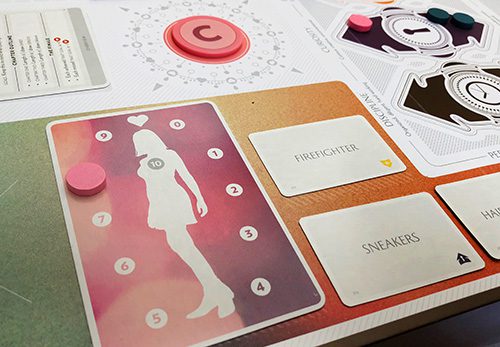
Within the first 10 minutes of my initial play-through of Fog of Love, my long-time gaming friend and I commented on how well designed the tutorial scenario was and how unique and engaging the overall game was.
He then paused and said, “Of course, I would never play this with my wife.”
“Of course not!” I responded, shaking my head. “We’re not that crazy.”
I don’t care how the game has you choose different physical traits for your characters. Or how different their jobs and statuses in life may be. When the game starts asking you to make the difficult relationship choices as your character — just like the ones you need to make in a reality-based relationship — the lines may begin to blur.
For instance, one situation has you both answering the question, “How many people have you been with before me?” Another has you deciding to go to a couples’ therapist. Or one of you decides you both need to lose some weight. Open a joint bank account? Convert to another religion? Or you say something in front of your SO’s parents that they take offense at, then demand your SO do something about it.
It’s a very neat concept for a semi-cooperative game, but one that I won’t be playing at home.
— Tom
Magic: the Gathering
Anybody that’s ever constructed a deck in Magic: the Gathering (M:tG) knows two things:
- It’s a labor of love. That deck becomes your baby and you take a certain pride and satisfaction in watching it grow and develop into something amazing.
- It’s a significant financial investment, too. In a game like M:tG, there are three ways to get the cards that your deck really needs: buy singles, buy a ton of booster packs and cross your fingers, or trade with other people for those cards (which requires you to have something they actually want and THAT requires – you guessed it – a large expenditure of capital).
Now imagine you’ve spent a great deal of time and money building a really strong deck. You’ve playtested it against yourself and were absolutely killer. Each time you played, you drew the perfect balance of mana and spells. Every hand was perfect and you were able to set your plan into motion effortlessly. And now you’re ready to take the deck out for a spin. There’s no doubt, you’re a force to be reckoned with.
When you take your creation into the local gaming store and run roughshod over everyone else, it’s easy to feel confident and proud. You can rest easy knowing that in the entire world, nobody has curated these specific 60 cards together in the same way that you have – at least not until now. Now everyone’s going to be copying your style. YOU are the one to beat. And even when you lose, it’s no big deal. You don’t know these people anyway. It’s just a friendly game between strangers and you’re free to leave at any time.
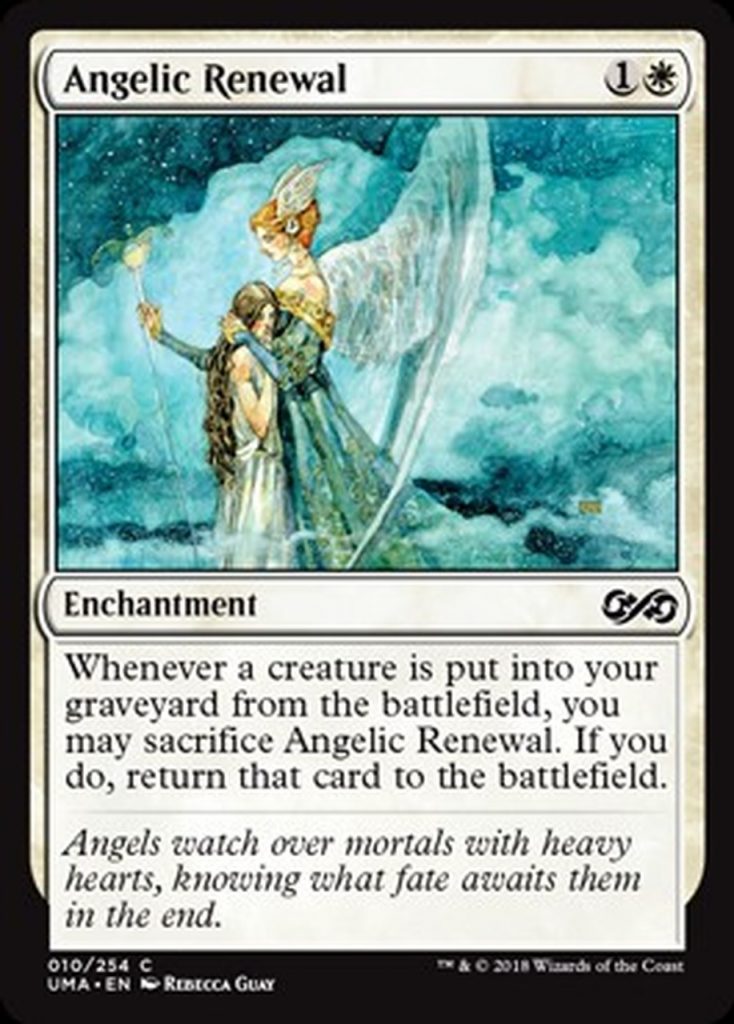
The reality of playing Magic: the Gathering with a Significant Other is vastly different than the scenario laid out in the previous paragraphs, though, especially when one (or both) of you is very competitive. At that point M:tG can quickly become a cutthroat dirty thing as one of you loses and immediately challenges the winner to a rematch before losing again and again. Each loss only spurs you on to another humiliating defeat like a gambler who can’t bring himself to stop throwing away his money in the hopes that the next round is going to be the jackpot round and that, somehow, all of the previous ignominy will be erased. It’s an ugly cycle that can quickly spiral out of control. And nothing drives a person off of the deep end quicker than feeling like the thing they’ve worked so hard to build and put such personal pride in is worthless, which is precisely what losing over and over again feels like.
It’s just as hard on the person that’s winning as it is on the person that’s losing. When you’re sitting in the winner’s circle and facing off against someone you truly care deeply about and that person is circling the drain, you feel guilty about feeling good that the deck you’ve built is doing so well. Any smile that touches your face is seen as a self-satisfied smirk. Any constructive criticism you offer is met with scorn and venom. Any suggestion to quit is viewed as you lording it over the loser that you’re the winner and they’re not. Even when you’re winning, you’re still losing.
Yes, Magic: the Gathering is a magnificent game, but only when you’re playing it with strangers or friendly acquaintances. Playing M:tG with someone you love is almost guaranteed to lower the temperature in the room and earn yourself a golden ticket to a one night stay on the couch.
— David
Cockroach Poker Royale
Does your relationship with your Significant Other have any Trust Issues? Want to introduce some into your life? Either way, Cockroach Poker Royale is a game to make any couple feel uncomfortable after playing, potentially for hours. Days, even.
The concept is simple: the deck of cards is made up of seven different ‘suits’ of critters (bat, cockroach, rat, scorpion, etc.), along with one Royale for each suit. The deck is shuffled and seven cards are dealt face down into a penalty pile. The rest of the cards are then shuffled out to the players.
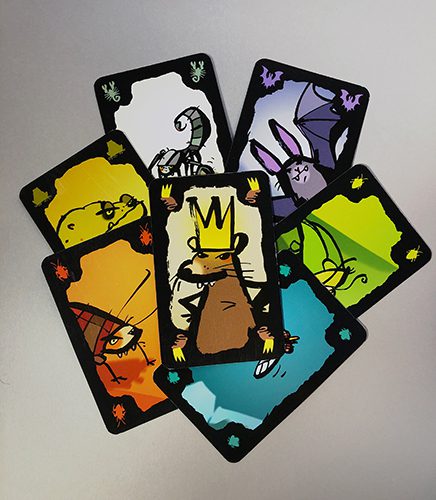
The goal is to not get four of a kind of any suit in front of you.
On a turn, you take a card from your hand and slide it in front of another player. You look them dead in the eye and say, “This is a _____” — where ____ is the critter of your choosing. That player then decides if they believe you. Or not. If they guess right, the card goes in front of you; if they guess wrong, they put the card in front of themselves.
If the card is a Royale, the ‘loser’ takes an additional card from the extra stack of cards.
I love the game so much I brought it to a neighbor’s house where we all played after dinner.
MIS-take.
Playfully, I slid a card in front of my wife.
“This is a Rat,” I said.
Deadpan, she looked at me.
“Yeah, well, I know how much I can trust you in things,” she said, her eyes not leaving mine.
Um, wait — what? This is just a friendly game, remember?
Even pushing truthful cards in front of her for the rest of the game did nothing to ease the awkwardness.
Later, I played it with my weekly gaming group. We invited two other people to play with us, one of which was the wife of one of the players.
“This is a Stink Bug,” he said, pushing a card in front of her.
“Aw, honey,” she said, smiling. “I know that after twenty years of happily married life that you would never lie to me about something as trivial as a card game, now would you? I mean, I’ve given you two sons. I’ve helped clean and cook and care for you and our home, right?”
Did I mention the other new player at the table was her mother? Yeah, my friend’s mother-in-law.
In those select situations I bring Cockroach Poker Royale out, it’s a hit. Those select situations, of course, don’t include Significant Others.
— Tom
Babel
In the game of Babel, you and your opponent sit on opposite sides of a board playing cards from your hands in order to build temples. These temples have different numeric values and it’s these values that add up to earn you the points that you’ll need in order to win the game. I’ve written a review of Babel in the past, so I’m not going to go into a lot of detail here about how it’s played. Suffice to say that a large part of the game is more about tearing down everything your opponent has built than it is about actually building your own stuff.
In a typical round of Babel, you might find yourself just 1 or 2 points shy of the 15 points needed to win the game. “This is it, “ you think. “One more turn and the game is mine.” Then your opponent takes their turn and in the blink of an eye, you’re left with nothing. In one fell swoop they have managed to wipe out every single point that you had on the board. Not only that, but now they are the one just a turn or two away from pulling off a win.
This is standard behavior for Babel. It’s a game that features massive swings in both directions. You never know what’s going to happen next and that’s what makes the game so exciting. It’s like watching your favorite sports team trying to tie up the game (or keep the other team from tying it up) during the last 2 minutes of the championship. The tension is real.
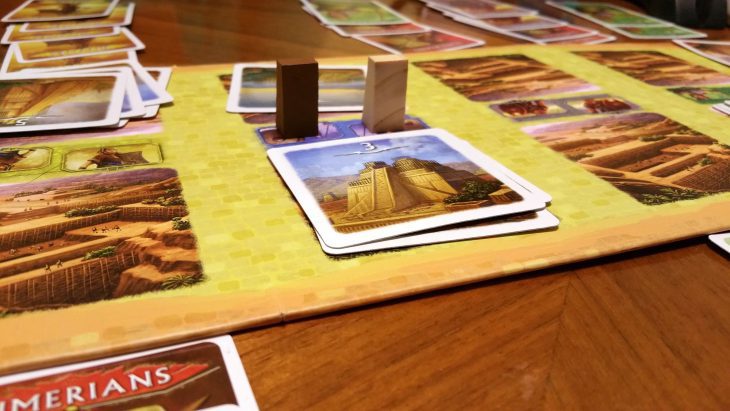
It’s this tension that lands this game on this list. When you’re playing Babel against an acquaintance or just a good friend, the targeted destruction of your temples doesn’t bother you any. It’s just part of the game. But when that targeting reticle is pointed at someone you’re intimately acquainted with, everything changes. It shouldn’t, but it does. You’re not attacking their temples. You’re attacking THEM or they are attacking YOU. It’s easy to forget it’s just a game and it’s even easier to take it personally.
The game seems especially cruel if you’re a huge fan of Uwe Rosenberg’s work. His designs are usually peaceful designs. Any aggression found in them is of the passive-aggressive kind; “I’ll take this action spot so that you cannot.” “I refuse to move the pawn forward because I don’t want you to put the tile that I want out of my reach on your next turn.” That’s the kind of Rosenberg-esque aggression we’re used to. But Babel features a straight up in your face style of aggression that’s very atypical for an Uwe Rosenberg game. There’s a huge difference between getting in someone’s way and punching them in the gut. It’s enough to knock the wind out of any close relationship.
— David
Chess
Friends know my wife as a charming, almost bashful person who wants to hear about you more than to talk about herself. If you have pets, especially cats, she’ll want to know all about them and meet them if possible. People describe her as kind, giving and sweet.
I thought the same thing about her, too. Until we played Chess.
To be fair, she was raised in a family of Nationally Ranked Chess Champions. As a kid, she would spend her evenings playing game after game after game with her father, watching as he worked his Knights like swords and giving away piece after piece to move a single Pawn to the back line.
When I discovered her potential interest in board games, I was encouraged. She suggested Chess with a sly twinkle in her eye.
That’s when I saw the Jekyll/Hyde transformation take place in her.
Her eyes narrowed. Her smile faded into a grim line of determination. Her turns were less moving pieces than pouncing on them and sweeping them off the board.
On one of my early moves, she snorted derisively at me. My move had not only not impressed her, but it appeared unworthy.
And therefore, so did I.
Yeah…
In my defense, years later I made her a wall-mounted Chess board for Christmas. The idea was that we could each make moves and allow the other to study the board at our leisure before making our next move.

The only problem was that she’d look at the board during the day and see a really good move. And then make it. Later in the day, while I was still at work, she’d see another really good move, and make that one.
I’d come home and find the board to be very, very different from the board I left in the morning. This despite a clear marker as to whose turn it was.
Chess is a game best left off the wall and stashed safely away in the hall closet.
— Tom
Caylus
In the game of Caylus the players are taking on the role of architects trying to build up a kingdom. For the most part, the game is a pretty standard worker placement and victory points game. Central to the game board is a road that is littered with action spaces and the players take turns placing their workers onto these spaces. Once that’s done, beginning at the start of the road and moving towards the road’s end, each action is carried out in turn. But what really sets Caylus apart is the Provost.
In Caylus, the Provost is a game element that’s controlled by the players that can be bribed with money to move up or down the road. When it comes time to perform the actions that have been chosen, everything stops at the Provost. If a player has placed a worker in a spot beyond the one that the Provost ends up on, then that worker does not get to perform the selected action. This can (and often does) mean that a player’s entire turn might be completely wasted. In a game with three or four people, this isn’t too bad. Everyone’s affected equally for the most part. But when playing Caylus with a Significant Other that you really care about, it can get downright evil.
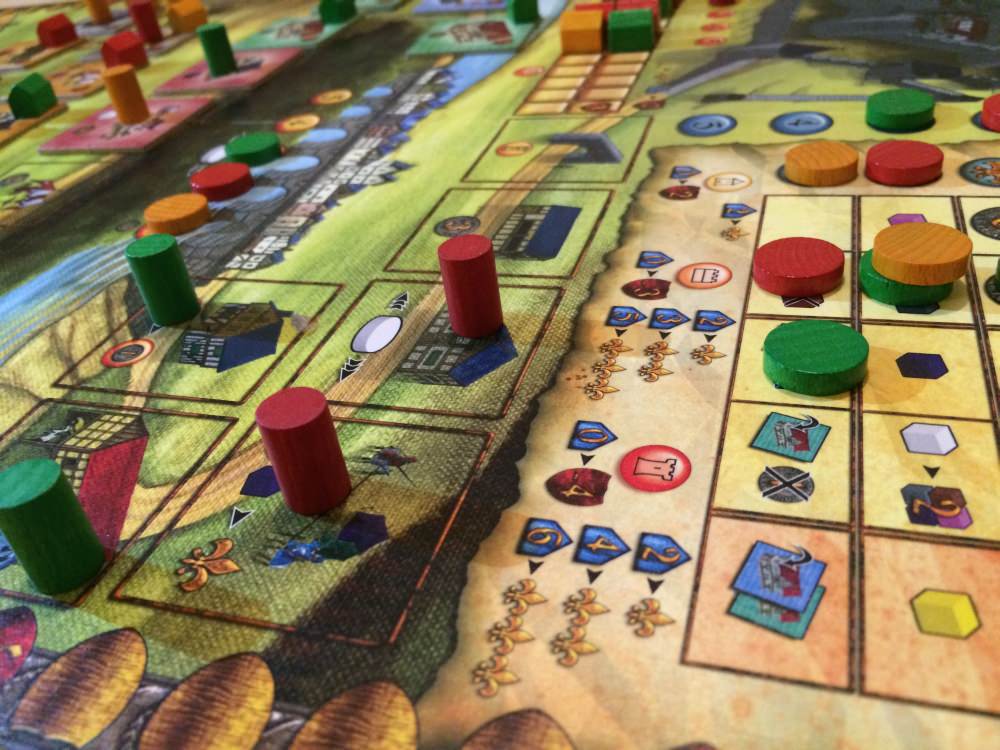
In games like Magic: the Gathering and Babel, the aggression built into those games is unavoidable. It’s just how the game is played. If you refuse to be aggressive, you’re going to lose. It’s just that simple. In Caylus, though, the players have a choice. If your Significant Other moves the Provost in such a way as to cause you to waste your turn, it’s very intentional. There’s no explaining it away. Even if they have moved the Provost further on down the road and you spend coin trying to move it back in the other direction, it’s very obvious that your overall intent is to eventually cause harm. If you’re hoping to go to sleep after the game in a peaceful household, your only real move is to always move the Provost as far away as you possibly can, which is completely counter to the intent of the game.
Caylus is a game that has caused more dark clouds to form in the room than any other. It sits there on my shelf staring at me just begging to hit the table. Its call is a siren call that’s hard to ignore. That is until I remember that I love my wife and that no game, as amazing as it may be, is worth sleeping on the couch for. Caylus is an easy game to love, but it’s one best saved for other company.
— David
In Closing…
There are a lot of other games that could fit on this list, but these are the worst offenders that we’ve personally encountered. These games share some common traits: they’re either aggressive in nature, are excellent at highlighting skill disparity, or involve trust issues.
So, the next time you’re thinking of grabbing a game to play with your Significant Other, stop and ask yourself: “Is this a game that is going to force us to lie, attack each other, or make us feel stupid?”
Also consider the size of your dog house. Can you even fit in there? Hopefully so since that’s where you’re likely to wind up.


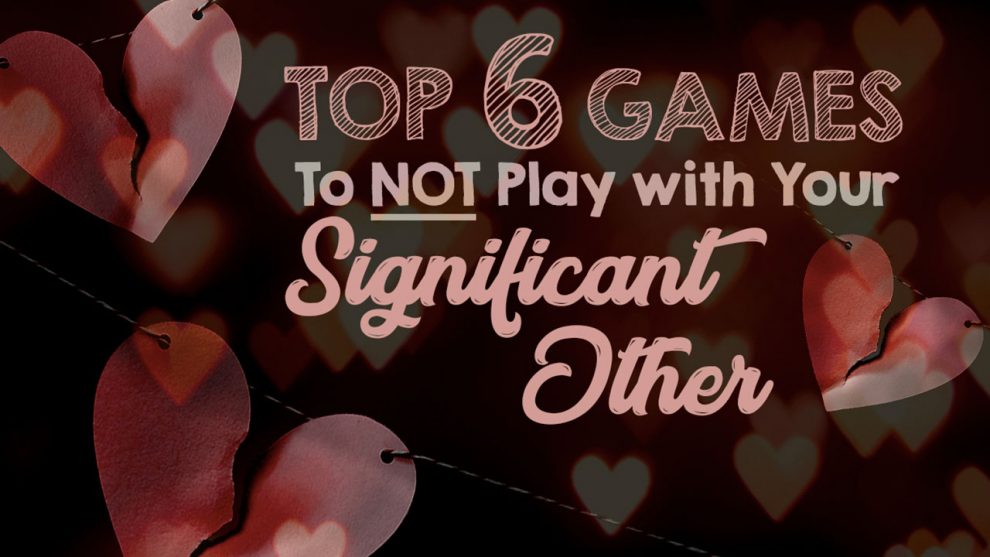








Interesting, informative, and very fun to read!
Thank you very much.